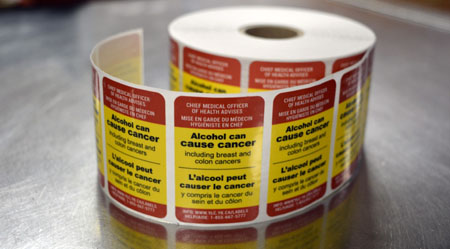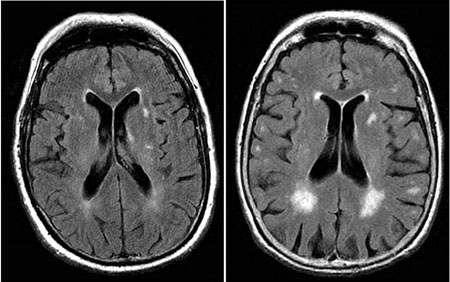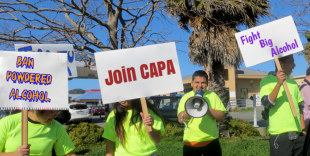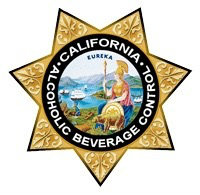Blog
Cancer Warnings Make Big Alcohol a Mean Drunk
 And when the industry gets mean, it reaches for its lawyers.
And when the industry gets mean, it reaches for its lawyers.
Roman philosopher Pliny the Elder once stated in vino veritas. It took another two thousand years for Europe to get around to putting veritas on its vino. Ireland is currently debating a robust bill to address alcohol harm that includes, for the first time in Europe, a large warning that alcohol increases risk of cancer.
Academic literature has long documented the relationship between cancer and drinking, with the International Agency for Research on Cancer labeling ethanol as a carcinogen back in 1987. However, these findings have been slow to make their way to public consciousness. This may be changing.
In November 2017, the American Society of Clinical Oncology (ASCO) issued warnings that even slight drinking can raise the risk of breast cancer. Heavier drinking dramatically raises risks of oral, pharyngeal, esophageal, and colorectal cancers-and, of course, cancer of the liver. Speaking to the New York Times, Dr. Clifford Hudis, chief executive of ASCO, cautioned, "The more you drink, the higher the risk. It's a pretty linear dose-response."
As ASCO was making this determination, the province of Yukon in Canada launched a bold experiment: to test cancer-risk warnings in a major liquor store in Whitehorse. Though vast in terrain, Yukon has only around 35,000 residents, allowing Health Canada to fund an experiment comparing buyer behavior in a store that uses the health warnings to ones in stores that sell alcohol as-is. Public health professionals were optimistic about its impact. "If results demonstrate an effect on consumer behavior," Yukon Chief Medical Officer of Health Brendan Hanley, MD, told MedScape, "there is potential for some important policy changes, not just locally but nationally and internationally, to address responsible alcohol consumption."
This message was heard loud and clear by the Canadian alcohol industry, which promptly issued threats of litigation. The province quickly backed down and stripped off the cancer warnings. John Streicker, the Yukon legislator tasked with overseeing the province's state-run liquor stores, was open about the effectiveness of the threat. "We need to do the responsible things," he told the New York Times, "which is to judge whether [litigation] is the best use of our money for our citizens. The hard choice is whether to pay for lawyers or whether to pay for harm reduction."
Yet no sooner had Canada put down the torch then Ireland picked it up. Minister for Health Simon Harris assembled a comprehensive harm minimization bill and put it up for debate. Included in its provisions are minimum unit pricing, restrictions on advertising, and point-of-sale controls. It also calls for at least one-third of the bottle to be covered in health warnings, including warnings that alcohol is a carcinogen. The bill has already passed the Seanad (Ireland's Senate) and is before the other deliberative body, the Dail.
This surge across the English-speaking world of recognition of alcohol's role in cancer has found a home in the United Kingdom as well. In early 2018, the Royal Society for Public Health (RSPH) began agitating for health labeling as well. Shirley Cramer, CBE, of the RSPH noted that 90% of U.K. residents are unaware of alcohol's carcinogenic effects. When it comes to health disclosures, she observed, "alcohol continues to lag behind. If we are to raise awareness and reduce alcohol harm, this must change."
Needless to say, both proposals have raised outrage from Big Alcohol's mouthpieces. A representative of U.K.'s liquor standards body the Portman Group complained that "there was little public interest in a radical overhaul of drinks labelling and strong opposition to cramming more information on packs." The Alcohol Beverage Federation of Ireland likewise complained that cancer advisories would be "devastating for drinks companies," and would cripple the industry "when the sector already faces major uncertainty, with Brexit negotiations ongoing."
Public health advocates should find these complaints heartening. Since these warnings are intended to encourage consumers to drink less and protect their health, Big Alcohol's objections means they are likely to work. Of course, if current behavior is any pattern, the alcohol control world won't know for sure until the first lawsuit is filed.
READ MORE about Big Alcohol's efforts to "pinkwash" cancer links.
READ MORE about minimum unit pricing in Scotland-and the lawsuits the country had to win to put it into place.
Over Half of All Early-Onset Dementia Tied to Alcohol
 Some of the worst effects of severe alcohol use kick in later in life, including liver failure, breast cancer, and diabetes. Now, a new French study adds early-onset dementia to the list. The findings, just published in The Lancet, looked at characteristics of 57,353 patients diagnosed with Alzheimer’s and similar conditions before they turned 65 years old. In 38.9% of the cases, dementia was directly due to neurological damage from drinking. In a further 17.6%, the direct link was absent but the patients nonetheless had an alcohol use disorder.
Some of the worst effects of severe alcohol use kick in later in life, including liver failure, breast cancer, and diabetes. Now, a new French study adds early-onset dementia to the list. The findings, just published in The Lancet, looked at characteristics of 57,353 patients diagnosed with Alzheimer’s and similar conditions before they turned 65 years old. In 38.9% of the cases, dementia was directly due to neurological damage from drinking. In a further 17.6%, the direct link was absent but the patients nonetheless had an alcohol use disorder.
Speaking to the Guardian, Dr. Sara Imarisio of Alzheimer’s Research U.K. cautions that this may actually underrepresent the hazards. “The study … doesn’t reveal the full extent of the link between alcohol use and dementia risk. Previous research has indicated that even moderate drinking may have a negative impact on brain health and people shouldn’t be under the impression that only drinking to the point of hospitalization carries a risk.”
“Every year we have another study showing how the consequences of drinking too much destroy lives,” said Michael Scippa, Public Relations Director of Alcohol Justice. “And every year, Big Alcohol pours another hundred million bucks into telling us how alcohol should be part of a healthy lifestyle. It’s a joke.”
The Guardian notes that “the study was not set up to look at the effects of moderate drinking on people’s dementia risk.” Still, burgeoning evidence shows that the brain can be damaged even when the drinker sticks to government guidelines.
New Book Highlights Community Efforts to Prevent Harm
 Alcohol control remains one of the most pressing public health projects of our time. It is complicated by a wealthy alcohol industry that wields tremendous social, political, and economic clout. Still, there have been some victories. Alcohol Justice Executive Director/CEO Bruce Lee Livingston and Advocacy Manager Director Jorge Castillo have been asked to recount a few of theirs in the new book, Preventing Alcohol-Related Problems: Evidence and Community-Based Initiatives, out now from APHA Press.
Alcohol control remains one of the most pressing public health projects of our time. It is complicated by a wealthy alcohol industry that wields tremendous social, political, and economic clout. Still, there have been some victories. Alcohol Justice Executive Director/CEO Bruce Lee Livingston and Advocacy Manager Director Jorge Castillo have been asked to recount a few of theirs in the new book, Preventing Alcohol-Related Problems: Evidence and Community-Based Initiatives, out now from APHA Press.
The book pairs research essays with case studies of successful prevention campaigns throughout the Unite States. To illustrate strategies to counter alcohol industry marketing, Livingston details Alcohol Justice’s campaign to remove alcohol ads from public transit in several cities in California. Castillo recounts a Friday Night Live campaign to restrict alcopop sales in Richmond, CA. Their chapters are alongside contributions from preeminent researchers and community advocates addressing critical topics in reducing harm including violence, service, age restrictions, disparities, and treatment, among others.
"Looking at everyone who pitched in to this book and all those successful projects across the country really reminds you that yes, local communities can win fights against Big Alcohol,” said Castillo.
Preventing Alcohol-Related Problems is available through the APHA store. Alcohol Justice contributors do not receive remuneration from sales of the book.
READ MORE about alcopops’ effects on youth.
READ MORE about how to get alcohol advertising off of public transit.
California ABC: Thou Shalt Not Mix Thy Weed and Alcohol
 As the first year of legal marijuana sales in California gets under way, California Alcoholic Beverage Control has moved to quickly to clarify the ways in which alcohol and marijuana should mix-that is, not at all.
As the first year of legal marijuana sales in California gets under way, California Alcoholic Beverage Control has moved to quickly to clarify the ways in which alcohol and marijuana should mix-that is, not at all.
In a new industry advisory aimed at alcohol license holders, the department has provided a little early mythbusting around the idea of combined alcohol-marijuana business ventures. Although many would-be entrepreneurs leapt to declare intentions to create marijuana infused booze, or to conduct marijuana-and-wine pairings, these are strictly verboten under the law as currently constructed. As ABC reminds, the Medicinal and Adult-Use Cannabis Regulations and Safety Act prohibits stores from selling alcohol and/or tobacco in the same location as marijuana products.
That means no:
- cannabis dispensing at bars
- roving sellers at nightclubs
- pairings of alcohol and marijuana
- cannabis-infused beverages (since by definition, a cannabis-and-alcohol beverage would be cannabis sold in the same place as alcohol!)
In addition, ABC specifies that there can't be "pass-throughs," where a dispensary is at the back of a bar.
"These are common-sense regulations. Legal cannabis shouldn't be used just to tighten Big Alcohol's stranglehold on California," said Bruce Lee Livingston, CEO/Executive Director of Alcohol Justice.
For questions or more information, go to http://abc.ca.gov.
READ MORE about how California must not make the same mistakes with marijuana regulation as it did with alcohol.More Articles ...
Help us hold Big Alcohol accountable for the harm its products cause.
| GET ACTION ALERTS AND eNEWS |
STAY CONNECTED    |
CONTACT US 24 Belvedere St. San Rafael, CA 94901 415-456-5692 |
SUPPORT US Terms of Service & Privacy Policy |


